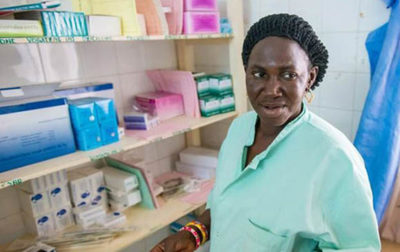Julie Gerberding is the executive vice president and chief patient officer, strategic communications, global public policy, and population health at Merck. She played a major role in responding to the 2001 anthrax bioterrorism events. Previously, she served as the director of the US Centers for Disease Control and Prevention, and before that, she was a professor of medicine at the University of California, San Francisco.
 Q: You have worked in academia, government, and industry. How do you think that partnerships among these three groups can be stimulated?
Q: You have worked in academia, government, and industry. How do you think that partnerships among these three groups can be stimulated?
A: For any partnership arrangement, establishing a common goal is absolutely critical. The second thing is that leadership skills for a network of equals differ from the skills necessary to manage a hierarchical organization. Leaders involved in these kinds of partnerships need to be able to understand the various stakeholder points of view and find the common ground. Probably most importantly, they need to have good negotiating skills to ensure that everybody is at least partially successful and that no one dominates or loses a significant proportion of their stake in the outcome. Lastly, you want to play to the strengths of each partner so that when you bring the entities together, you create a whole that is greater than the sum of its parts.
Q: How do efforts to research diseases afflicting the world’s poorest populations work within the constraints of a business?
A: There is a tradeoff between the volume you sell and the price you sell it for. In countries like the United States where the cost of a disease is very high, it makes economic sense to invest in medicines that command a fair price so that the economic framework can be justified by the benefit we achieve. In a resource-poor country where diseases cost very little in economic terms, it would not make sense for drug prices to exceed the economic value point. In those markets, we try to maintain a high volume of access. We end up creating a tiered pricing model that allows the best price fit for the market while reaching as many people as possible.
Q: The “Merck for Mothers” program launched in 2013, and one year later, it reported a 30% decrease in maternal mortality in target districts in Uganda and a 35% reduction in Zambia. What made this initiative so successful?
A: One of our important partnerships in this program was in Senegal. We worked collaboratively with the Gates Foundation and some other partners to create a supply distribution system for family planning products that improved access dramatically across the country. The project was so successful that the government of Senegal adopted the model for HIV, malaria, and tuberculosis drugs. The key element there was identifying an important problem: lack of access to contraception, which is a major risk factor for maternal mortality.

The “Merck for Mothers” partnership in Senegal provided an estimated 3.2 million women with consistent access to a full range of contraceptive methods.
Q: What is your involvement in improving disease surveillance methods?
A: As a company, we have both human health and animal health business, so we have adopted a comprehensive policy at Merck that harmonizes human and animal antimicrobials. In that context, we need a global understanding of where antimicrobial resistance is occurring and what settings are most likely to cause clinical problems. We have a global surveillance system, the Study for Monitoring Antimicrobial Resistance Trends (SMART), where we collect bacterial strains, bring them to our laboratories, study their characteristics and resistance profiles, and track them over time. We make that information available locally so that individual health institutions understand emerging trends and can adapt their decisions about antimicrobials.
Q: What challenges arise when working with local populations?
A: Trust is really a function of three things. First and foremost, it is telling the truth. Second, you have to be transparent about the impact your decisions will have. The third factor is that you must walk as you talk. We can be truthful about the problem of antimicrobial resistance and transparent with the data, but if we do not conduct our marketing activities in a way that respects appropriate antimicrobial stewardship, then we will not be trusted. We have put a high premium on waking our talk: we market our antimicrobials appropriately, and we invest heavily in stewardship programs in several hundred hospitals. We set up systems to help local clinicians understand their own patterns of drug resistance and create their own guidelines for how drugs should be used. We are developing vaccines to prevent infections in animals so that they do not have to be treated with antibiotics. Again, it is not just talking about a problem, it is about making sure that what we do matches what we say.
